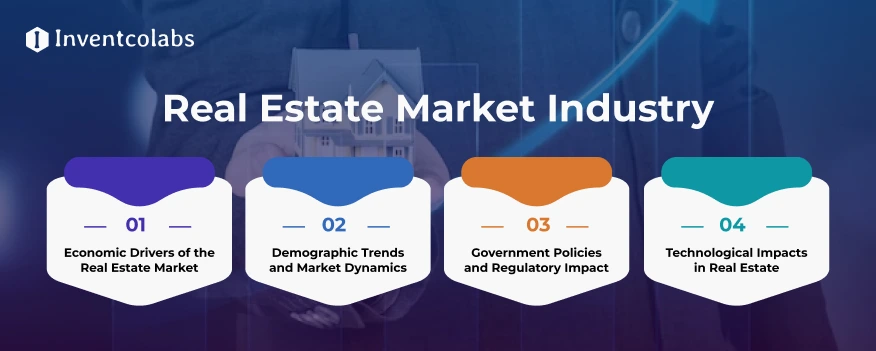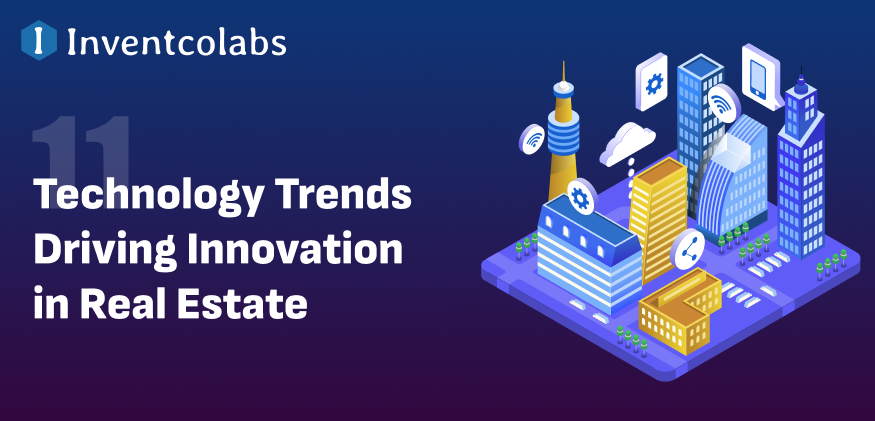Have you been curious about what’s driving innovation and upsurge in the real estate industry lately? If that’s your concern for the day, you should stick with us!
The real estate industry, which was conventionally recognized for its bricks-and-mortar phase, is all set to transform into an active field driven by technology. The rise of technological trends in 2024 is improving how real estate works. From seamless property financial transactions to better estate handling, the top 11 technology trends we focus on in this blog are all set to hit the mark of innovation in the real estate sector. But before that, let’s throw some light on what real estate technology holds for the future.
Real Estate Market Industry: What’s the Hype About?

The real estate firms comprise an enormous sector that includes commercial, residential, and industrial lands. These firms play a primary role in the sector and are presently undergoing market trends and evolving client preferences, and require enhanced transparency. Therefore, real estate market professionals must stay ahead of the curve to combat these challenges and remain competitive by integrating technological advancements. Let’s break it down into segments to better understand the complete domain.
> Economic Drivers of the Real Estate Market
Among the core influencers of the real estate market is the comprehensive economic growth of a country. Economic growth is well ensured when real estate professionals and firms invest in it openly, while economic downfalls may result in market disruption as caution becomes necessary. Thus, economic drivers are impactful in deciding the performance of both buyers and sellers in the real estate market.
> Demographic Trends and Market Dynamics
While the top real estate technology trends in 2024 are pivotal drivers, demographic changes are also significant in shaping the real estate market. The requirement for different properties arises from factors like population growth, migration rate, and variations in household systems. For instance, the urbanization trends induce demands for non-rural housing and business locations, all thriving in the real estate sphere.
> Government Policies and Regulatory Impact
The government rules and regulations and the relevant policies are again very important for the real estate market. The zoning laws, interest rates, and revenue incentives standardized by the government affect the availability and reasonability of real estate. Furthermore, the rules that underline the use of land, environmental policies, and building codes directly impact the growth and sustainability of the assets, forming the entire market posture.
> Technological Impacts in Real Estate
The contribution of technology in real estate development is unmatched as of 2024. The innovative trends are propelling the real estate industry towards streamlined transactions and selling/buying practices of the properties. How? Virtual conveniences like online platforms, 3D structures, and digital equipment improve the effectiveness and access to property search, bargains, and marketing. This augmented space has connected the buyers, sellers, and mediating agents to collaborate in a virtual environment.
Read More: How Much Does It Cost to Create a Real Estate Mobile App?
Sectoral Overview: Residential, Commercial and Industrial Real Estate
The real estate industry is widely classified into three major parts: residential, commercial, and industrial, where each has its own attributes. Residential estate deals with trading houses, apartments, and other residential spaces, which are influenced by population dynamics and lifestyle choices. Commercial estates deal with lands used for business occasions such as office edifices, retail places, and restaurants. Industrial estates comprise land regions that are used for manufacturing, supplying, and reserving goods. This works to evolve the supply chain management and e-commerce patterns.
> Stakeholders and Transactional Aspects
Real estate negotiations associate different stakeholders: buyers, sellers, real estate brokers, lenders, and other legitimate experts. The brokers are the intermediaries who assist the buyers in finding the right investment party and initiating transactions. With top real estate industry trends and innovative solutions, real estate agents can conduct better property transactions that are well-defined and data-driven.
> Financing and Investment Strategies
Financing is critical for the real estate market, where many buyers depend on mortgage loans to sponsor purchases. Certain elements affect the affordability of real estate and the collective market practices, which include credit availability, interest rates, and lending regulations. Real estate investment is generalized among individuals and institutions looking for portfolio enhancement.
> Sustainability in Real Estate
The real estate industry thrives and sets standards while building sustainable and eco-friendly approaches. Green property programs, energy-saving technologies, and environmentally friendly design basics are now incorporated into property development measures. More and more stakeholders are ranking sustainability, playing their part in encouraging awareness of climate change and environmental influence.
Read More: How to Develop A Rental Marketplace App – Cost and Features
The Finest 11 Technology Trends Set to Drive Innovation in Real Estate in 2024

The real estate industry is on the boundary of a technological revolution, with 2024 composed to be a year of outstanding innovations. As we inspect the top 11 technological trends that can shape the future of real estate, it’s obvious that technological advancements are not just changing how we buy and sell properties but are remodeling the entire real estate ecosystem.
> Real Estate Mobile Applications
Real estate mobile applications continue to be game-changers in the field. In the year 2024, these mobile applications are anticipated to go beyond the basic property listings. More advanced features such as virtual property tours, augmented reality interfaces, and customized property recommendations are set to improve the user experience. Nowadays, real estate firms are investing more and more in mobile app development to stay competitive and offer users seamless, on-the-go access to property information.
> Real Estate Mobile App Development
The increasing demand for feature-rich real estate mobile apps has led to a surge in real estate mobile app development. Real estate firms are partnering with specialized development companies to create customized solutions. Collaborating with a real estate app development company ensures that the app aligns with the firm’s unique requirements, offering a user-friendly interface and robust functionalities.
The demand for features-rich real estate mobile apps has led to a rush in real estate mobile app development. The firms from real estate are partnering with specialized development companies to build customized solutions.
> Real Estate Mobile App Development Cost
Comprehension of the cost related to real estate app development is important for firms planning to travel into this space. The real estate app development cost depends on factors like app complexity, features, and the experience of the developing team. While it’s an investment, the returns of amplified user engagement and smooth processes make it a worthwhile endeavor for real estate firms looking to stay ahead in a competitive market.
> Real Estate Software Development Company
Selecting the right state software development company is essential to maintaining technology. A well-reputed real estate software development company brings expertise in building scalable solutions. The right partner ensures a seamless and efficient digital transformation, even if it’s consolidating customer relationship management (CRM) tools, data analytics, or workflow automation.
> Real Estate Industry Trends
Staying in a row of real estate industry trends is necessary for a firm goal to remain competitive. Modern technology including artificial intelligence (AI), blockchain, and the Internet of Things (IoT), is remodeling the industry practices. AI-powered chatbots can be used for customer interaction and solving queries, blockchain for secure transactions, and IoT for smart homes are just a few examples of how these trends are making waves in the real estate sector.
Read More: Property Finder App Development – Cost & Features
> Technology in Real Estate Development
In the developing side of real estate, they also witnessed a technological revolution. Building Information Modeling (BIM) is smoothening the design and the building processes, resulting in more efficient and cost-effective projects. Construction management software allows real-time collaboration between project stakeholders, reducing delays and improving overall project outcomes.
> Real Estate Mobile Application
On the far side of property search and transactions, real estate mobile apps are increasing their scope to include comprehensive property management features. From rent payments to maintenance requests, these applications are slowly becoming the focal point for property owners and tenants. This combination of smart home controls further boosts the appeal of these apps, offering a panoramic solution for property-related activities.
> Top Real Estate Industry Trends and Innovative Solutions
Innovation in real estate is not limited; they are diverse in technology; it’s a convergence of various trends and solutions. Prediction and analyzing property valuation, blockchain for transparent transactions, and using drones to inspect properties are examples of how real estate firms adopt innovative solutions to stay ahead in the field.
> Real Estate Property Management
Real estate property management systematically is the main focus of the real estate industry, and technology is playing a vital role in this area. Cloud-based property management software makes tasks easier, like lease management, rent collection, and maintenance coordination. IoT devices allow remote monitoring and control of property systems, ensuring superb functionality and minimizing operational hassles.
Read More: Airbnb Clone App: A Complete Application Development Guide
> Blockchain in Real Estate
In the field of real estate transactions, blockchain technology is making waves. Its scattered and tamper-proof nature brings transparency and security to property transactions. Smart contracts, powered by blockchain, smoothen and automate the processes, minimizing the need for intermediaries and improving the overall efficiency of real estate transactions.
Explore More: Top 12 Easy Steps to Build an Online Shopping App
> Hire Dedicated Developers
Many firms opt to hire devoted developers to locate the compound landscape of real estate technology. These devoted developers bring specialized skills in app development, AI, blockchain, and other relevant technologies. Hiring committed developers ensures that real estate firms have a dedicated team that focuses on creating personalized solutions aligned with their business objectives.
Read More: How To Develop An Apartment Management Software – Features & Cost
In Conclusion
The real estate industry is undergoing an intense transformation phase powered by technology. This blog’s top 11 technology trends constitute an earth-shattering shift in how real estate firms work, interact with clients, and manage properties. As we move towards the year 2024, the firms that grab these trends and innovation will be at the forefront of the progressing real estate landscape without any doubt.
We suggest you hire dedicated developers for advanced real estate mobile applications, modern software solutions, and the fusion of emerging technologies. The future of real estate is digital, spirited, and defined by innovation. Be well-informed about the evolving, adapting, and thriving real estate market in this flourishing digital age!
FAQs
Let us examine some general FAQs for you to grab useful insights on the current trends influencing real estate.
Q1. What key technology trends will shape the real estate industry in 2024?
Ans: The key technology trends in real estate in 2024 include AI-powered analytics for property pricing, augmented and virtual reality for engaging and satisfying property tours, plus blockchain for protected and honest transactions. These technological trends help make informed decisions, enable interactive experiences, boost reliability and security in seamless transactions, and reform the overall landscape.
Q2. How do these technology trends impact property buyers and sellers?
Ans: The trends enable the buyers to grab verified insights for making reliable decisions and present innovative marketing tools to the sellers through engaging experiences. This further allows for organized transactions between parties in the real estate business sphere.
Q3. Are these trends accessible and adaptable for all types of real estate markets?
Ans: Though adoption rates fluctuate, these trends provide worthy solutions for various real estate markets. It improves optimation across distinct areas of the real estate market.
Q4. How long does developing a custom software application for a real estate business take?
Ans: The degree of complexity of the real estate applications, the attributes and features needed, and the scope collectively determine the timeline for software development. Usually, it takes around a few months to a year or more.
Q5. How can a real estate app development company benefit my business?
Ans: A real estate app development firm will help you organize functionalities, improve customer experiences, and provide customized solutions to mandate tasks and smoothen data handling. It will, therefore, allow for well-informed decision-making, optimizing the entire trading procedures for real estate.





